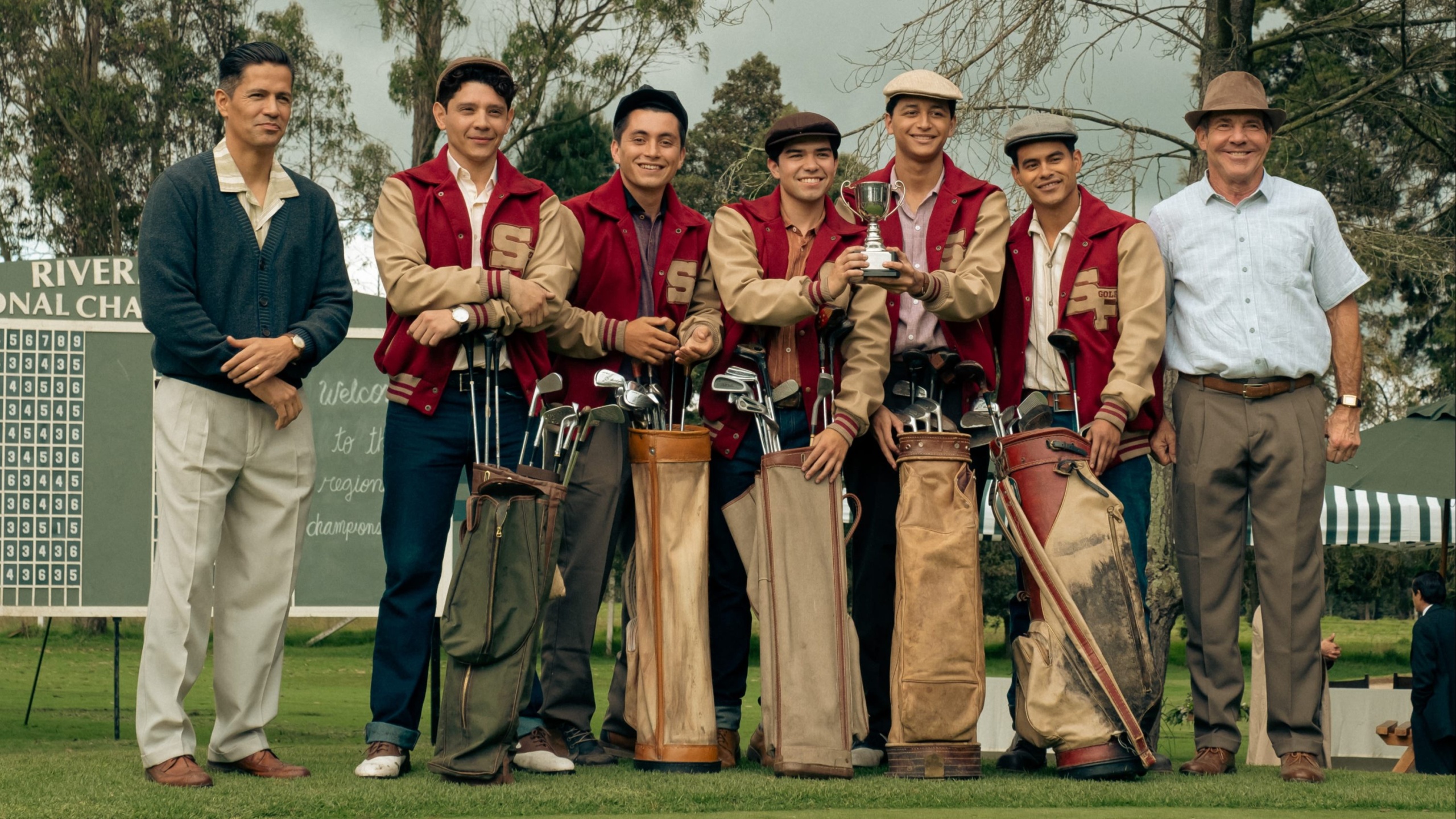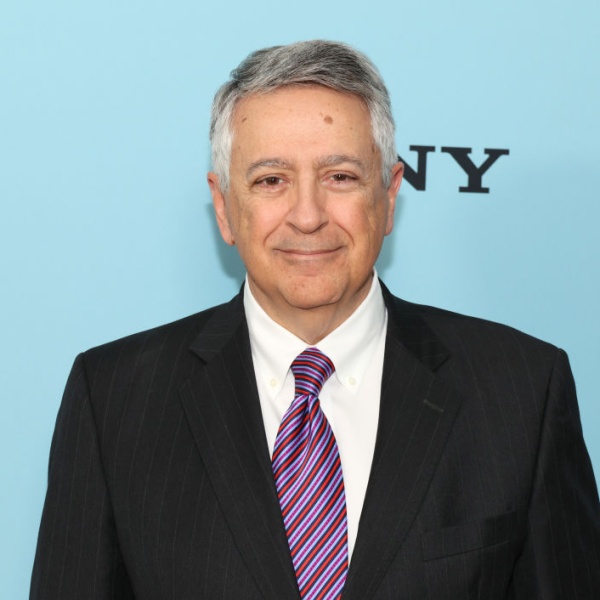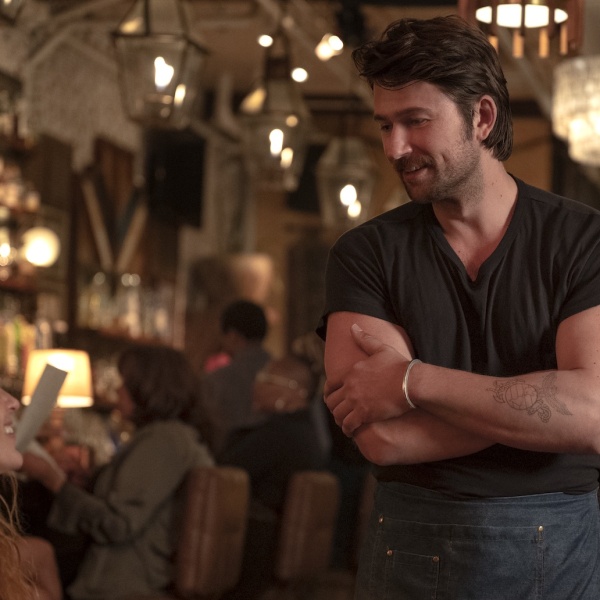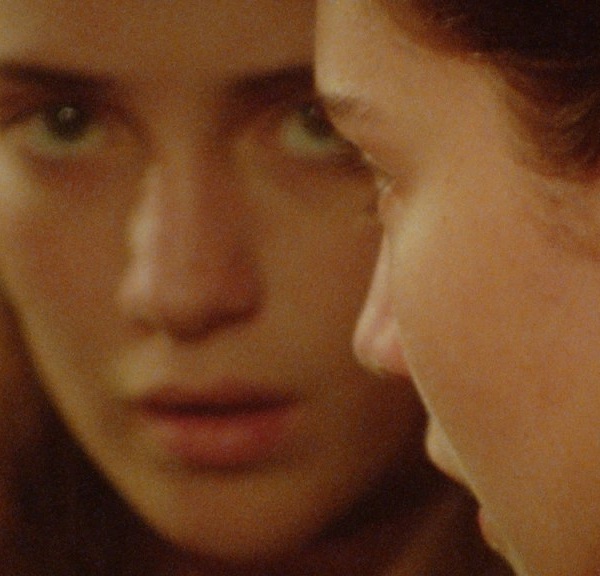Dennis Quaid’s fading career prospects and emergent Reagan fetishism have spurred a recent swerve into inspirational — often explicitly Christian — films about hard-luck white guys who find salvation through classic American values like prayer, football, mid-century warfare, and lowering taxes on the rich.
That trend unambiguously continues with his supporting role in Julio Quintana’s “The Long Game,” an underdog sports drama in which Quaid plays the reluctant patron of a Mexican-American high school golf team in a hyper-racist Texas border town circa 1956. And yet, for all of its wildly hackneyed cliches and white savior overtones, this line drive of a movie epitomizes why Quaid might still avoid becoming the next Jon Voight: Whatever your political or religious convictions, he makes you want to believe in the better angels of our nature.
The America he misses did that too, and making films that indulge in such Boomer nostalgia allows Quaid to pretend that his America was a real place that existed beyond the white imagination — a place that might be possible for us to recreate someday. After all, like “Midway,” “The Hill,” and “American Underdog” before it, “The Long Game” is based on a true story.
But at a time when patchy, low-budget sports dramas have become synonymous with conservative messaging, and corn-fed actors like Quaid are just as crucial to that aesthetic as wooden dialogue and glossy digital camerawork, “The Long Game” only seems to be par for the course. At the risk of overstating the subversive intent of a golf movie so milquetoast it makes “The Legend of Bagger Vance” feel like “Happy Gilmore” (and at the risk of suggesting that Quintana had some kind of ulterior motive in re-teaming with producer Quaid, whom he previously directed in “Blue Miracle”), this inclusive crowd-pleaser mimics the posture of an Erwin brothers’ production in the service of a Latino-driven story about the virtues of beating white people at their own game. It isn’t about Quaid’s character, but it’s kind of about who’s playing him.
If “The Long Game” has a legitimate protagonist, it would have to be JB Peña (a too-recessive Jay Hernandez, fighting an uphill battle against the bare functionality of his role), an Army veteran who moves his wife to Del Rio, Texas so that he can start a new job as the superintendent at San Felipe High School. But work anxiety isn’t what keeps JB up at night — it isn’t why he’s introduced staring at his bedroom ceiling and trying to stave off the sweatiest PTSD flashback this side of “Munich.” No, JB only cares about being accepted by the country he risked his life to serve. So far as he’s concerned, that means becoming the first Mexican-American member of the all-white Del Rio Country Club. Alas, the Republican-coded racist caricatures who run the joint are a coven of hilariously broad cartoon villains whose favorite part about golf is making underage brown kids carry their bags, and JB’s membership bid is denied in no uncertain terms.
But when one door closes, an errant golf ball crashes JB’s car window and smacks him right on the head. It turns out that the Latino teens who caddie at the club have developed their own fascination with the game — they’ve even carved their own course out of some weeds on the side of the highway. The minute JB identifies the boys as San Felipe students, he decides to create the school’s first golf team. Not for nothing, but the state championships are hosted at the Del Rio Country Club. It’s a tall order to compete with all the white kids born with a nine-iron in their hands, but JB gets a boost from his old war buddy turned weary benefactor Frank Mitchell (Quaid), a Del Rio member whose losses in the Korean War left him with some deep misgivings about following the rules. Cue: endless montages, Cheech Marin as a magical groundskeeper named Pollo, whose chain metal work outfit makes him seem like he just stepped out of Arthurian legend, and a long-distance putt for every gross display of racism.
Written by Quintana, Paco Farias, and Jennifer C. Stetson, “The Long Game” smacks into every conceivable trap it can find on its course to glory (racist diner owners, self-hating immigrant fathers, resentful drunks on the Mexican side of the border, etc.), but the movie’s lived-in charm is easiest to appreciate whenever it’s on the proverbial fairway. Quintana’s greatest asset is the young cast he’s assembled to play the San Felipe Mustangs, and while only one of them is afforded a legitimate subplot (he gets two in fact, both of them histrionic), the kids are fun and fully credible in the many scenes where they’re just hanging out together.
The chiseled and pouty Julian Works plays Joe Treviño, whose James Dean vibe would probably be enough to make him the de facto leader of the group even if this movie didn’t also privilege him with a semi-abusive father (Jimmy Gonzalez) who’s been so mistreated by white America that he resents his son’s efforts to assimilate. The rest of the Mustangs aren’t given the chance to make a similar impression (one is largely defined by how much he wishes he looked like James Dean), but Miguel Angel Garcia, “In the Heights” breakout Gregory Diaz IV, Christian Gallegos, and “The Society” star Jose Julian galvanize this movie with the lived-in camaraderie they infuse into every moment of their screen time.

Hokey and schematic as “The Long Game” can be, it surprisingly never feels that way when the Mustangs are being dehumanized for their brown skin. So many tropey movies about intolerance and oppression frame those things as if their characters have never encountered them before, but these boys treat it like ambient noise. When the owner of the local gas station shoos them away in the film’s opening minutes (“this ain’t no taco stand!”), Joe’s friends hardly even seem to hear it, while Joe doesn’t hear it at all because he’s too busy scrapping with a bunch of white kids in an alley nearby. Did they call him a racial epithet? “No, but they were probably thinking it.” It’s a fun and telling way to kick off a story that isn’t about triumphing over bigotry in one fell swoop so much as it’s about determining the most impactful way to chip away at it over time (“The Long Game” is something of a double entendre).
JB, who doesn’t have a son of his own (as his adoring wife reminds us virtually every time she appears), is convinced that Mexican-Americans will only find acceptance by appealing to white people on their own terms. “The only way these boys are going to advance in life is by playing by the rules,” he insists, as if the game isn’t rigged against them. As if the kids aren’t mistaken for caddies in the same breath as Frank is mistaken for their coach when they show up for their first tournament. Frank, on the other hand, has a different idea of what a meaningful victory might look like, and it’s a testament to Quaid’s grizzled humanity that his character’s wisdom never feels like stolen valor. The movie seems to forget that Frank is first introduced as a functional alcoholic, just as the movie seems to forget that its most substantive conflict stems from his and JB’s philosophical disagreement. But there’s something beautiful to the idea that helping these kids might be enough to quiet Frank’s demons, especially because “The Long Game” never allows those demons to overshadow the task at hand.
For better or worse, Quintana’s film tends to play things safe and stick to the most obvious beats of a story like this — a curious choice in light of JB’s argument, and a strange one in light of how little “The Long Game” seems to relish its most dramatic moments. The golf scenes are plentiful, but Quintana refuses to mine any real suspense from the tournaments. The Mustangs’ eventual success is so taken for granted that it hardly seems to matter where they are in the season or what the players’ respective strengths might be, let alone the stakes of each shot.
“The Long Game” is determined to ape the tropes of a feel-good sports drama, but only as a means to an end, and its struggle to balance the demands of the genre with the deeper concerns underpinning this story ultimately stops either side of that equation from going the distance. Paulina Chávez is a delight as Joe’s love interest, but the wooden scenes between them fail to tee up the decision Joe has to make about what to do with his life, and where to find a meaningful degree of acceptance.
While a more ambitious film might have used its tropes to leverage this tale into a richer account of Latino assimilation, this one is simply content to let its characters win on somebody else’s terms. Maybe that’s the most responsible approach to a story about a group of Mexican-American kids who eked out a memorable victory in a fight for acceptance that’s only gotten worse in the decades since. Maybe you have to win the game before you can change it. This light and breezy movie doesn’t have a clear opinion on the subject. For all of the perspective implied by its title, “The Long Game” is perfectly happy to take things one hole at a time, stick to the fundamentals, and trust in Pollo’s wisdom that “nobody can stop a man who can get out of a bunker.”
Grade: C+
Mucho Mas Releasing will release “The Long Game” in theaters on Friday, April 12.




